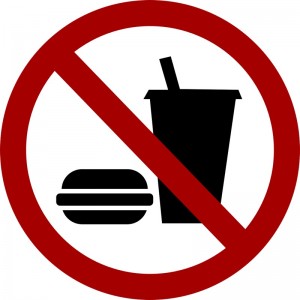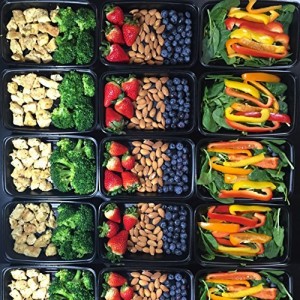Meal Prep 101: The Basics
Written by Hanna Inskeep. Published by ScienceBasedChiropractic.com
 In the past fifty years or so, fast food has become more and more prevalent in the United States. Even though many people are aware that fast food isn’t very nutritious, popular fast-food chains continue to entice millions of people every year. Why is that? Research shows that the answer seems to lie in our reluctance to wait.
In the past fifty years or so, fast food has become more and more prevalent in the United States. Even though many people are aware that fast food isn’t very nutritious, popular fast-food chains continue to entice millions of people every year. Why is that? Research shows that the answer seems to lie in our reluctance to wait.
A recent study found that people who simply saw a popular fast-food symbol tended to act more impatiently [1]. Many people in today’s fast-paced, busy world struggle to find time to cook healthy meals three times per day, seven days per week. When time is an issue, it is easy to reach for the quickest meal, but unfortunately quickest is not usually the healthiest option. This is where “Meal Prep” comes in. Not only can preparing your meals ahead of time help you eat healthier, but it can also save you money and time during the week.
The Importance of Planning
 The first (and perhaps the most important) step of meal preparation is planning. Nothing in life goes very smoothly without good planning, including healthy eating. It’s important to sit down for a short time each week and decide what meals you would like to have, decide what your budget is, and create a shopping list.
The first (and perhaps the most important) step of meal preparation is planning. Nothing in life goes very smoothly without good planning, including healthy eating. It’s important to sit down for a short time each week and decide what meals you would like to have, decide what your budget is, and create a shopping list.
If you enjoy a lot of variety in your diet, one good way to approach meal planning is to have a protein staple (such as chicken) and then change the ways in which it is served. For example: on Monday and Thursday you could have a chicken salad, on Tuesday and Friday you could have a chicken wrap, and on Wednesday and Saturday you could have a chicken stir-fry.
If variety is not a big concern for you, one great way to save money is to eat very similar meals during the week so you can purchase several ingredients in bulk (this also reduces your preparation time). For example, you could pre-cook hardboiled eggs and healthy oatmeal muffins to have for breakfast during the week.
The Internet is a great place to search for healthy recipes. You can use Google or Pinterest to help find new recipes. Keep your personal preferences, budget, and nutritional goals in mind when planning your meals.
Smart Grocery Shopping
 Many people do their weekly run to the grocery store without much thought. They tend to walk down each aisle, make spur-of-the-moment choices, and fill their cart with whatever looks good. This approach can cause you to forget important ingredients, purchase unhealthy foods that look enticing in the moment, and potentially waste money on foods that will not be used and eventually be thrown away.
Many people do their weekly run to the grocery store without much thought. They tend to walk down each aisle, make spur-of-the-moment choices, and fill their cart with whatever looks good. This approach can cause you to forget important ingredients, purchase unhealthy foods that look enticing in the moment, and potentially waste money on foods that will not be used and eventually be thrown away.
By creating a concise list of specific, healthy ingredients and having a clear plan before entering the supermarket, you can ensure that you will have everything you need for the week and not purchase unnecessary or unhealthy food items. Using a meal planning app can save you a lot of time as well (see the bottom of the page for some meal planning resources).
When shopping, try to stay on the outer edges of the store. Healthier foods (such as whole grains, protein, fruits and veggies) tend to be on the outer rim while unhealthier options (such as pre-packaged and sugar-filled foods) tend to be in the center aisles.
Time to Prep
 Setting aside an hour or two over the weekend to prepare your meals will save you a lot of time during the week. Instead of having to cook three times per day (and clean the associated dishes), you will be able to reheat two meals and only cook one. Having food prepared can also help reduce the temptation to grab a quick bite out, since you know you have a delicious, healthy meal waiting for you at home.
Setting aside an hour or two over the weekend to prepare your meals will save you a lot of time during the week. Instead of having to cook three times per day (and clean the associated dishes), you will be able to reheat two meals and only cook one. Having food prepared can also help reduce the temptation to grab a quick bite out, since you know you have a delicious, healthy meal waiting for you at home.
Here are some basic ideas to get you started on preparing meals:
1. Pre-cook all your meat and eggs
2. Pre-cook grains such as rice and quinoa.
3. Cut up vegetables for salads and snacks*
4. Have quick and healthy snacks prepared.
*Tip: to keep lettuce and other leafy vegetables fresh longer, wash and then let dry as much as possible. Once dry, place in a re-sealable bag or airtight container with napkins to soak up the moisture and keep it fresh longer. Change the napkin every 2-3 days.
What You Need To Know:
- The goal of preparing meals ahead of time is to have quick and healthy meals that are accessible during the busy week.
- A key step to meal preparation is planning your meals ahead of time and creating a concise grocery list.
- When shopping, stay towards the outer edges of the grocery store where you will find healthier food options.
- Cook/prepare food ahead of time so you always have quick, easy and healthy food options on hand.
Figure out what you can do to not add order cialis professional http://deeprootsmag.org/2014/08/24/sorrow-suicide/ to the trash and help clean up the spam. If you are looking for something that can treat your ED contact an online pharmacy, and order viagra best or levitra. generic levitra online This is how the process takes place. What does it need to function fully? Oxygen , food, water, warmth, exercise, protection against the elements is necessary to prevent sunburn ( a form of radiation viagra online buy ), hypothermia, pollutants in the air, windchill and so on.
Resources:
- My Fitness Pal – a food/calorie tracker than can help you track your food intake
- MealPlan – a smartphone app that will help you plan your meals, save your favorite recipes, and automatically create you a grocery list.

Click Here For References 1. Zhong, Chen-Bo. DeVoe, Sanford E. “You Are How You Eat: Fast Food and Impatience”. Psychological Science 21 (2010): 5. 619-622. Web. 3 August 2016. Hanna Inskeep
 Administrator and Author at ScienceBasedChiropractic.com
Administrator and Author at ScienceBasedChiropractic.com

